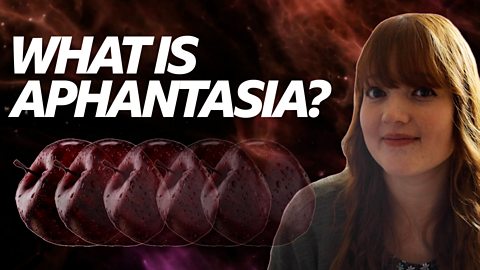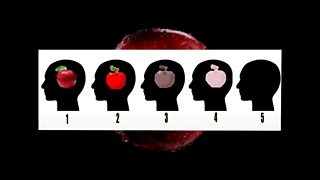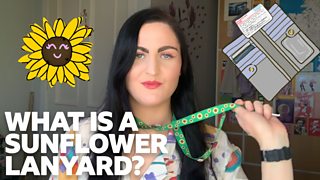Aphantasia - what it's like when you can't recall mental images in your mind
By Ashley Dick // �鶹�� The Social contributor // 15 June 2021
What does it look like inside your mind? Over the last few years this question has transformed my understanding of myself and everyone I know, because it turns out it doesn’t look the same for everyone. We may all live in the same world, but we’re experiencing it a completely unique and individual way.

What is Aphantasia? | Inside Your Mind
This is what it's like to have Aphantasia
For me I discovered I have synesthesia in 2017, an ‘anomaly’ where I constantly observe maps, shapes and colour associations in my mind.
So if you asked me what I was doing on Friday, through no overt effort I would imagine myself standing on that particular day looking over at Friday and examining the activities I have planned. Or, on hearing a song, I begin to form a shape with colours and movement that allow me to remember the sounds and lyrics.

I’ve been sharing my experience with synesthesia and trying my best to convey what this looks and feels like for a few years, but one person in my life had a very hard time grasping the concept. My oldest friend and I grew up in the same village, went through primary and secondary school together, were both chosen to play brass instruments, learned to read and play music at the same time, and enjoyed a lot of the same songs, movies and books. But where I drew upon my imagination to navigate the world, Becky had a very different experience: she cannot imagine anything at all.
Becky doesn’t experience seeing anything in her ‘mind's eye’. In fact she has no mind's eye at all. Ask her to picture a face or a place, and her memories don’t have visuals. This phenomenon is called aphantasia, which is classed as the inability to visualise mental images.
Aphantasia was first described by Francis Galton in 1880 in a statistical study about mental imagery describing it as a common phenomenon amongst his peers. It remained largely unstudied until 2005, when The University of Exeter was approached by MX, a man who seemingly lost the ability to visualise after undergoing minor surgery.
Following the publication of MX's case in 2010, a number of people reported a lifelong inability to visualise prompting more research into the phenomenon.

It is thought that an estimated two to three percent of people have aphantasia, - to put that into context it’s just as common as the possibility of having ginger hair - but because it's not a recognisable, everyday term many people with aphantasia will go their entire lives without even knowing that it exists.
Becky identifies with this experience, recalling her discovery of being an aphant: “I didn’t know about it at all and had never heard of it in my life. My friend sent me a link to a Youtube video with someone asking ‘Do you have aphantasia?’ It was a kind of imagination quiz, asking you to close your eyes and imagine an apple. Then rate on a scale of one to ten, how vivid is the apple? And I thought, 'well, there is no apple.' The video explained that this is aphantasia, if you can’t see anything then you have it.
“I think that the memories I remember the most are ones that I have physical evidence of. When I think about my childhood bedroom I know that it was purple because there’s a picture of it. But that’s the only reason I can remember that it’s purple. It’s just information, I can’t see it in my head.”

Becky doesn’t experience seeing anything in her ‘mind's eye’. In fact she has no mind's eye at all. Ask her to picture a face or a place, and her memories don’t have visuals.
At first this sounds like a form of amnesia, as if aphants navigate life without any reference of memory. However, this is not the case. In Becky’s case she feels she’s great at remembering people, and being able to recall details about someone she hasn’t seen in years. She just cannot visualise them. “If you were to ask me to draw a person or describe a person’s face from memory I couldn’t. But if you brought me that person or showed me a picture of their face I could tell you exactly who it was.
“When I talk to you about how you read books, I feel like I’m missing out on so much. You say when you read a book it plays out in your head like a film. For me, it’s just my voice reciting words. There’s no images, there’s no main character, there’s nothing like that. I read Harry Potter before the film came out, and I remember at the time a lot of people going ‘Oh that’s not how I imagined Hermione’. And I remember thinking, What does that mean? ''That's who she is.”
Kate, another aphant tells me that when it comes to memory recall it’s like a list. She can remember what someone was wearing, or where they were. How she felt at a specific time and place. She could recite to an artist in accurate detail the scene but she wouldn’t be able to ‘see it’ in her mind's eye until someone recreated it for her.
“It’s like a list. A very detailed one that i can remember. I don’t think it hinders me in any way whatsoever but I do spend a lot of time wondering just what it would be like should i suddenly be able to ‘see’ these images. After a lifetime of no images I think it would be very intrusive and I worry that I'd lose my mind by being bombarded with things I've never lived with."
As much as the inability to imagine seems like an impediment, it's well accepted in society that people who live in the present are a lot happier than people who worry about the future, or dwell on the past.
I wonder if aphants experience is an advantage of not holding onto surplus information that prolongs our negative feelings and thoughts.
Becky explains, “I don’t tend to overthink things, which I think is really nice. If something bad happens I usually get over it very, very quickly. I had an interview recently which I didn’t think went well, but it’s gone. I can’t remember what I said, I can’t remember what the room looked like, I can’t remember what the people looked like. It just fades so fast, so it just doesn’t really bother me.”
Kate on the other hand tells me that she holds onto conversations more in her mind. “For me I overanalyse previous interactions and conversations. Not being able to picture someone's reaction to the conversation means I lose the visual cues that people give off that help you contextualise how an interaction went. The little smiles, or nods are just not there so for me it’s an almost clinical analysis of the words, that from time to time my brain will misinterpret forming an incorrect conclusion which may shape how I interact with that person in future. It’s a lot like reading a text message, without the context, meaning and tone can be lost."
I think, like both Becky and Kate, I find advantages and challenges from the way our minds perceive the world.
Overall, these discoveries, and learnings have led me to think in a very broad sense, about how every single person’s mind works differently. And just as everyone’s experience of synesthesia is unique, so is the experiences of those with aphantasia.
In the case of myself and Becky, it’s fascinating to me that you can take two very similar people and put them through the exact same lifestyle, but they’ll experience it completely differently internally, which inevitably leads to a pretty different experience externally.
I think we all have a unique perspective on the world, and now, I want to start asking, more and more, what does it look like inside your mind? Because we’re all different, perhaps in more ways that we initially imagined.




